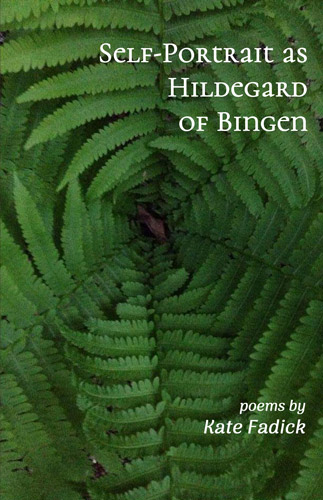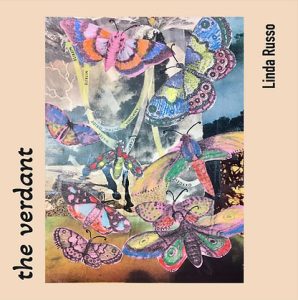Self-Portrait as Hildegard of Bingen
Poet Kate Fadick (who uses the pronouns “they, them, their”) has written a compact and thematically focused chapbook of poems inspired by the life of the German Benedictine abbess Hildegard of Bingen. Hildegard died in 1179 but remains remarkable for her ecological/cosmological mysticism as well as her achievements in music, theology, languages, playwriting, natural science and botany. Fadick, who only began writing poetry in their late 60’s, is the author of a previous chapbook of poems, Slipstream, published by Finishing Line Press in March, 2013.
Poet Kate Fadick (who uses the pronouns “they, them, their”) has written a compact and thematically focused chapbook of poems inspired by the life of the German Benedictine abbess Hildegard of Bingen. Hildegard died in 1179 but remains remarkable for her ecological/cosmological mysticism as well as her achievements in music, theology, languages, playwriting, natural science and botany. Fadick, who only began writing poetry in their late 60’s, is the author of a previous chapbook of poems, Slipstream, published by Finishing Line Press in March, 2013.
In one of the poems in this new collection, Fadick wonders: “where are words / that become flesh // that grasp / for wild holiness.” The answer (according to this reviewer) is: Fadick’s chapbook! Almost all of the poems here reflect upon the holiness of embodiment (either in the human body or in nature) but they do so under a menacing shadow of ecological destruction. In the poem that opens the collection, “Antigone’s Birds,” the poet writes that in the “face of the coming extinction”:
one weedy species
wails a broken note or twoawaits birds of omen
cries of comfortfrom the gods or
golden frogs
The meditative quality of Fadick’s poetry is enhanced by the sparseness of the short, two-line arrangement with extra (double) blank spacing in between. It leaves room for the words to breathe on the page. The construction is also somewhat fragile, as the poet explicitly admits later, acknowledging that these are “poems made of glass // blown at the edge / of the bent world.” There is no guarantee that such fragility will survive. And yet, there is
some comfort
to think the peony
needs the antthe poem needs
the poetto think the ant craves
the bud’s waxy sweetnessand the poet some
lure of words
This short chapbook (a mere 25 pages) has been artfully produced by Glass Poetry Press with vellum inserts. Based out of Toledo, OH, this micropress produces four to six chapbooks a year and until the 2018 midterm elections, for every chapbook purchased, Glass Poetry Press has made a commitment to donate $1.00 to the ACLU.
One of the things I most appreciate about the chapbook format is its concentrated brevity. Most chapbooks can be read in one sitting in about an hour. If a full-length poetry collection is like a four-course meal, a chapbook is more like a shot of distilled whiskey. And the lyrical liquor that Fadick has brewed for us does the trick quite nicely. You will find these poems to be spiritual but not dogmatic, a mix of “elegance / and blasphemy // strong enough / to drive nails // vulnerable enough / to shatter from within.”





